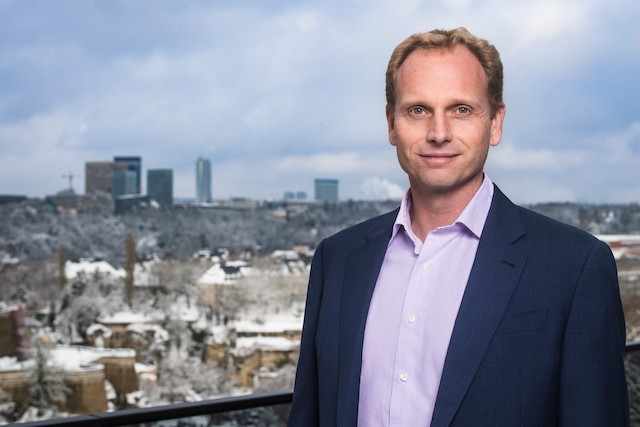Supported by Yahoo Finance, the Outstanding LGBT+ Role Model Lists “showcase LGBT+ business leaders and allies who are breaking down barriers and creating more inclusive workplaces across the world.” They also feature an LGBT+ Executives and an LGBT+ Future Leaders category.
Polli “empowers others to become active allies”, the list says about him. Under Polli, HSBC has organised Pride Week discussions and events. Polli is also member of the CEO Equal Opportunities Network, which aims to drive inclusion across all levels of business.
Could you tell us more about the Role Model Lists?
The Outstanding LGBT+ Role Model Lists is an association that is recognised in the field of diversity and inclusion of LGBT persons. [The Ally Executives List] puts forward people who, without being LGBT, are strongly involved in supporting and promoting justice and equality in the workplace.
Honestly, I don’t consider this an award for myself but for HSBC Luxembourg and our internal forum for diversity and inclusion. We have people who work on this without respite and who are very passionate about it. I think it’s the outcome of all the work that we have achieved together these past two years to really get things moving and improve. For me, the prize wasn’t given to a person but to the whole team.
How did you come to apply?
I must admit that I didn’t know about this prize. A friend who is member of the diversity forum and LGBT+ told me about it. He asked me if I was ready to apply to receive this award. I understood that it was important to him and the members of the forum. I don’t exactly know what the jury looks for to make its decision, but I think it was linked to three things.
First, we organised a lot of things around these topics and sponsored pride week, despite covid. We also wrote a lot of articles and implicated other people, like the Dutch ambassador. And thirdly, there is a personal aspect to this commitment. There was awareness raising at a personal level. I’m not LGBT. I’m a white, middle-aged man, married and father of three children. I don’t think you can get more boring than that.
Could you expand on this personal aspect?
As a child, I lived in Europe. One of my mother’s sisters lived in the US, near Boston. She was married and they had two children. We didn’t see each other very often. At the time, it was more difficult to travel than today.
I remembered Aunt Rachel as a grumpy person. She wasn’t the most extroverted person I knew, the most amicable or kind. But she was family. Then she got divorced. And when I saw her a few years later, I was surprised to see her with a girlfriend. But what surprised me more was how she had changed: she was friendly, smiling, outgoing, she laughed. She knew all about me, what I was doing; she asked questions. All these years, she had felt obligated to marry without attraction, to start a family and to live this artificial and fake life. Once freed from this obligation to hide and make believe something she was not, she became herself.
The profound reason for my commitment is that I see the impact that having to conceal, hiding their true nature has on people. It’s completely wrong. We must help people free themselves so they can express their talent.
Why is inclusion so important in a company?
First, it’s a question of justice. We shouldn’t treat people differently based on the colour of their skin or their sexual orientation. We don’t do it for people with blue or brown eyes. They are things that are, in my opinion, predetermined by genetics and not something we can control. It’s about treating people fairly.
And for a company, it seems difficult to image to me what is would mean for your talent base if you eliminate half the population. Companies must attract talent, whatever shape it comes in, whether male or female, LGBT or not, disabled or not, whatever their skin colour.
If I want to win, and if I want to be the best and serve my clients, shareholders, employees and all stakeholders in the best way possible, I must be inclusive. It’s only like this that I can guarantee that I will build the best team possible. The more I can attract and retain people, the better I will do.
Did you feel any resistance at the bank to your commitment?
Not that I know of. I think HSBC at group level is very, very open to all these questions.
When I arrived in December 2018, the diversity and inclusion forum was just a discussion group. We gave it high-level support, a budget and legitimacy. Since then, the forum has grown a lot.
We regularly do a survey among our staff, roughly every six months. The last dates from mid-2020. The percentage of positive responses to the question “I feel able to be myself” has grown 10%. We are near 80%.
For the question “people can express their opinion without fear of consequences”, the number of positive responses went up 14%. And for the question “where I work, people are treated fairly”, the progression was 13%. The difference is noteworthy. Everyone feels better in their skin and their way of working and interacting.
We also do tests during recruitment to ensure that the values of our future employees correspond to ours--being open, connected and trustworthy. And I think that helps, too. People who come here know what to expect. They know we want an open and welcoming culture. And that is what we expect from everyone in return.
This interview was first published in French on paperjam.lu and has been translated and edited for Delano.
